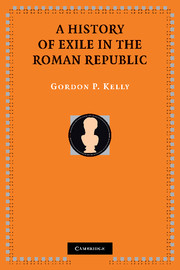Book contents
- Frontmatter
- Contents
- Preface
- 1 Introduction
- 2 Exilium: Legal and Historical Issues
- 3 The Journey into Exile: The Early Republic to the Social War
- 4 Exilium from the Social War to the Death of Julius Caesar
- 5 Topics of Exile
- 6 Prosopography of Roman Exiles
- Conclusions
- Appendix I The leges Clodiae Concerning Cicero's Exile
- Appendix II Restoration of Legendary Figures of the Early Republic
- Bibliography
- Index
Conclusions
Published online by Cambridge University Press: 26 October 2009
- Frontmatter
- Contents
- Preface
- 1 Introduction
- 2 Exilium: Legal and Historical Issues
- 3 The Journey into Exile: The Early Republic to the Social War
- 4 Exilium from the Social War to the Death of Julius Caesar
- 5 Topics of Exile
- 6 Prosopography of Roman Exiles
- Conclusions
- Appendix I The leges Clodiae Concerning Cicero's Exile
- Appendix II Restoration of Legendary Figures of the Early Republic
- Bibliography
- Index
Summary
The practice of roman exile was inextricably linked with the larger political scene of the Republican era. Exile was not a static institution, but it was affected by the major events in Roman history and developed in response to them. Exilium was a relatively uncomplicated phenomenon down to the late second century. Roman aristocrats who elected to retire into exile normally relocated to nearby Italian civitates foederatae. Often they had some pre-existing personal tie to their new homeland. Although close to Rome, their banishment was permanent.
The political instability and violence that entered Roman domestic affairs in the time of the Gracchi changed the face of exilium. Internal strife resulted in a dramatic increase of politically motivated prosecutions, and thus more elites were forced to go into exile. However, this same instability made restoration from banishment possible: with a change in the political situation at Rome (often by the massacre of opponents), an official recall could be engineered. The case of P. Popillius Laenas highlights the changing nature of exile under the pressure exerted by partisan politics during this era. As consul in 132, Popillius played a key role in the suppression of the supporters of Ti. Gracchus. In 123, when he was threatened with legal proceedings by C. Gracchus for his actions years earlier, Popillius chose to go into exile to avoid prosecution. He traveled outside Italy for his banishment – the first time a Roman is recorded as having done so.
- Type
- Chapter
- Information
- A History of Exile in the Roman Republic , pp. 221 - 224Publisher: Cambridge University PressPrint publication year: 2006



